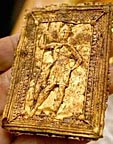

Archaeologists in Bulgaria have unearthed the treasure-filled tomb of what is thought to be a Thracian king.
A golden crown, ring, armour and other artefacts dating back 2,400 years were found with the skeleton in a tomb near the south-eastern town of Zlatinitsa.
National Museum of History director Bozhidar Dimitrov said the Thracian king was a young ruler who was buried with two horses and a favourite dog.
Excavations of burial mounds across Bulgaria have unearthed similar finds.
But Professor Dimitrov says there is something different about this burial.
Ring clue
"He seems to have died suddenly," he told the BBC News website.
THE THRACIANS
Lived in what is now Bulgaria, Romania, northern Greece and Turkey from around 4000 BC
Conquered by Rome in AD 46
Not thought to have had own alphabet
Described by Herodotus as "savage, blood-thirsty warriors"
Finds include ceramics, bronze, gold and silver jewels
In pictures: Thracian riches
"Like the Egyptians built pyramids and used them as temples before they died, the Thracian rulers built mounds. When they died they were buried inside and earth was piled up on top. But here there was no mound."
The bones are still being excavated and will be sent to Sofia for examination. But Professor Dimitrov says the ruler seems to be a young man in his prime who was given a lavish funeral.
As well as the crown wreath and animals, the tomb included decorated bronze, iron and copper armour and body wear, engraved with scenes from Greek mythology.
The large ring on his finger shows a Thracian ruler on a horse being crowned by a Greek goddess.
"This is important as in Thracian religion this is an obvious ritual for when someone is crowned king," said Professor Dimitrov.
Investigations are continuing as to the identity of the ruler. The professor's theory is that he was a ruler called Sevt, referred to in Greek writings relating to the period.
He said Sevt inherited a region from his uncle and, faced with a disgruntled local population, paid the Greek army to help take control.
But he says there were around 23 kingdoms in Bulgaria during the same period, so finding the exact identity will require further research.







No comments:
Post a Comment